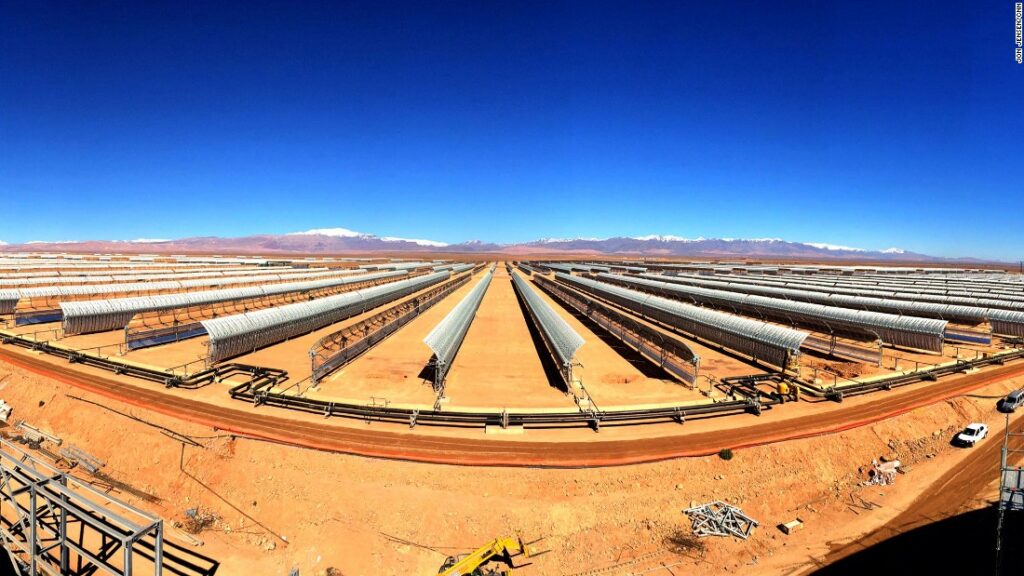Morocco’s green credentials an example for the Arab world

The Middle East and North Africa region is at serious risk from the effects of the changing climate — warming at twice the global average. With consecutive COP summits being held in the Arab world in 2022 and 2023, there is a real opportunity to build some momentum. However, according to the 2023 Climate Change Performance Index, only one country in the region, Morocco, ranked among the nations of the world most orienting their economies toward climate change. Given that the region is at the forefront of the effects of climate change, it is important that lessons learned from Morocco’s transition are employed elsewhere.
Morocco recently ranked seventh in the Climate Change Performance Index, placing it first in the Arab world and Africa. How Morocco is orienting its economy toward climate change is increasingly important, especially as this is desperately needed elsewhere in the Arab world. The index looks at four categories to evaluate the climate protection performance of 63 countries, which are together responsible for more than 90 percent of global greenhouse gas emissions. The next two countries in the region were ranked 48th and 62nd, leaving room for improvement.
This is not, however, the only area in which Morocco is taking steps that can be replicated elsewhere in the region. The EU this month renewed its green energy deal with Morocco as Brussels seeks to become the world’s first carbon-neutral economy. Though Morocco was the first country in the region to sign a green partnership deal with the EU, other Arab countries share similar geographical advantages, making them key generators and logistical hubs for renewables, much like Morocco.
As Morocco ramps up its export of renewables to Europe by investing in two major power interconnections, its generating capacity of 11,000 megawatts is being supplemented by a further 4,030 MW of renewables production. Once completed, Morocco’s Noor complex will be one of the largest solar power-generating facilities in the world, covering more than 6,000 acres. By 2030, the old North African kingdom expects that it will more than meet its targets, exceeding 64 percent green production of its total energy requirements. As other countries in the region are doubling down on hydrocarbon exports, they risk missing an opportune moment to invest in renewables for their own long-term economic prosperity and to reduce the adverse effects of climate change on their economies.
Though the economic outlook for oil producers in 2023 is robust, it is important that Arab countries look beyond hydrocarbons, because the MENA region is at serious risk from the effects of the changing climate. While a growing number of Arab countries are committing to net zero, a lot more needs to be done, not only in conjunction with global targets, but also locally to increase renewable energy production and to divert resources to the mitigation of climate change.
A lot more needs to be done to increase renewable energy production and to divert resources to the mitigation of climate change.
Zaid M. Belbagi
Unprecedented sand storms in the Arabian Peninsula and drought and desertification in formerly arable areas of North Africa are bringing the climate crisis home. According to the World Economic Forum, should global temperatures rise by 2 degrees Celsius, rainfall in the region will decline by 20 percent to 40 percent. This will be compounded by rising sea levels affecting coastal areas and salinizing water in coastal aquifers and wells.
Though Morocco has made great strides, it and other countries in the region must do more. The ongoing protests in Iran were preceded by a round of demonstrations regarding water scarcity. In Egypt and Tunisia, the governments are buckling under the cost of imported grain — a grave new reality because countries in the region can no longer feed themselves.
Morocco’s hosting of COP22 in 2017 did, however, show leadership, with the most recent summit also having taken place in the region, at Sharm El-Sheikh in Egypt. This seems to have raised the profile of climate matters regionally, with the upcoming 28th gathering taking place in Abu Dhabi.
Hosting a COP invariably puts pressure on host countries to showcase their own commitments to combating climate change. Indeed, ahead of hosting COP28, the UAE has updated its second national climate plan, with an upgraded greenhouse gas emissions reduction target of 31 percent by 2030. However, should Arab countries seek to make lasting changes, they must seek to reduce their energy and water consumption. And Morocco is heading toward a 15 percent reduction in energy consumption by the end of the decade.
The recent Davos meetings were another opportunity to highlight the headway Morocco is making in the renewable energy space. Morocco’s example should serve as an important model for other nations in the region that are already feeling the social, political and economic effects of climate change. Given their exposure, the countries of the Arab world simply have no option but to go green, and they certainly do not have the time that other, more temperate, regions have in terms of delaying their transition.





